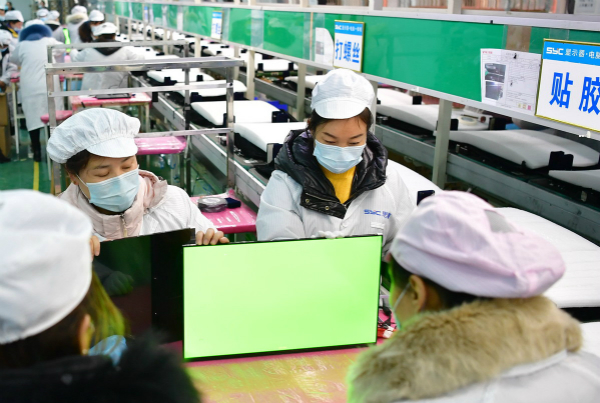Free trade coasts on multilateral ties

Workers of a company in the Xi'an International Trade and Logistics Park's comprehensive bonded zone inspect display monitors to be exported via the China-Europe freight train services. China's foreign trade is expected to steadily grow next year. [Shao Rui/Xinhua]
Despite potential headwinds from the worsening of the pandemic across the globe during the fourth quarter of this year and declining goods demand, the basic advantages and growth conditions of China's foreign trade, like the industrial cluster effect, labor quality and well-developed logistics networks, have not changed, said Gu Xueming, president of Beijing-based Chinese Academy of International Trade and Economic Cooperation.
He stressed that China was able to quickly adopt a series of policy measures to stabilize foreign trade across the country earlier this year, focusing on key links and overcoming deficiencies.
Thanks to its early recovery from the contagion and the government's supportive policies, China's foreign trade sustained its upward momentum in November with impressive growth and improved structure, according to the latest trade figures released by the General Administration of Customs.
The country's foreign trade expanded 7.8 percent year-on-year in November, with exports jumping 14.9 percent and imports declining 0.8 percent on a yearly basis. China's foreign trade of goods totaled 29.04 trillion yuan ($4.17 trillion) between January and November, up 1.8 percent year-on-year.
Although international travel still remains a headache for many of their foreign clients, exporters at Yiwu International Trade Market in East China's Zhejiang province, reported that the sales through e-commerce channels have surged in the second half of this year. A large number of foreign buyers chose a shipping container as a basic purchasing unit, which is much bigger than small units of purchase in the past.
"Owing to the pandemic, many foreign consumers have chosen to work from home. They have more time to carry out do-it-yourself, or DIY, activities, including furniture assembly, gardening, vehicle maintenance and repair. Orders for products in these categories have notably grown on our e-commerce channels over the past several months," said Zhou Xianglan, deputy general manager at Yiwu Yitijian E-commerce Co Ltd.
She said among the FAQs posed on Yitijian's sales platforms are: "Do you have these ... products?" and "How many do you have in stock?"
The firm found that overseas clients no longer bargain hard, but prefer to use that time to sort out other urgent business matters like demand and supply issues, growing ocean shipping costs, and the availability of ocean shipping containers.
























